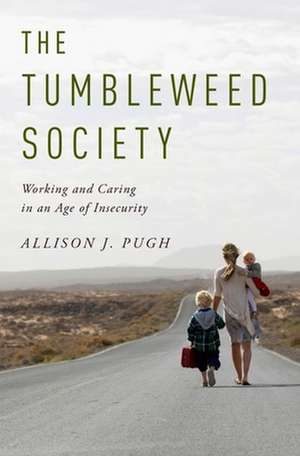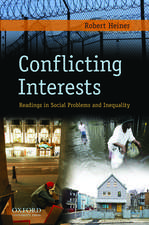The Tumbleweed Society: Working and Caring in an Age of Insecurity
Autor Allison J. Pughen Limba Engleză Hardback – 21 mai 2015
| Toate formatele și edițiile | Preț | Express |
|---|---|---|
| Paperback (1) | 196.61 lei 6-8 săpt. | |
| Oxford University Press – 5 apr 2018 | 196.61 lei 6-8 săpt. | |
| Hardback (1) | 172.21 lei 11-16 zile | |
| Oxford University Press – 21 mai 2015 | 172.21 lei 11-16 zile |
Preț: 172.21 lei
Preț vechi: 208.68 lei
-17% Nou
Puncte Express: 258
Preț estimativ în valută:
32.95€ • 34.48$ • 27.37£
32.95€ • 34.48$ • 27.37£
Carte disponibilă
Livrare economică 03-08 martie
Preluare comenzi: 021 569.72.76
Specificații
ISBN-13: 9780199957712
ISBN-10: 0199957711
Pagini: 278
Dimensiuni: 155 x 236 x 31 mm
Greutate: 0.5 kg
Editura: Oxford University Press
Colecția OUP USA
Locul publicării:New York, United States
ISBN-10: 0199957711
Pagini: 278
Dimensiuni: 155 x 236 x 31 mm
Greutate: 0.5 kg
Editura: Oxford University Press
Colecția OUP USA
Locul publicării:New York, United States
Notă biografică
Allison J. Pugh is Associate Professor of Sociology at the University of Virginia. Her book Longing and Belonging: Parents, Children, and Consumer Culture won the William J. Goode Book Award from the American Sociological Association Section on Sociology of the Family, and the Distinguished Contribution Award from ASA Section on Children and Youth.
Recenzii
The Tumbleweed Society offers a subtle, brilliant look at how people craft a sense of ethical purpose in an era of laissez-faire institutions, where the community has little to offer and financial security can vanish overnight. It's also a riveting read, rich with fascinating human stories.
The Tumbleweed Society provides a fascinating and original account of the ways that work insecurity seeps into the family lives of the millions of Americans who can no longer count on stable employment.
Does the end of the lifelong, one-company career in America just affect work? Or does it, as Allison Pugh asks in this brilliantly illuminating book, influence how we address the possibility of grievous disappointment in intimate life too? Do we hedge our bets in love and work, or trustingly sacrifice in one or both realms, and risk feeling betrayed when a contract turns out to be 'unrequited'? The reader will find eye-opening answers on this central issue of our age.
The rise in precarious work during the past three decades has produced dramatic changes in both work and family life. But people have adapted to insecurity differently, depending on whether they are stably employed, have been laid off, or had to relocate. The Tumbleweed Society vividly describes the diversity of experiences that characterize the new era of precarity through the voices of those who have experienced a variety of work arrangements and family formations.
Sociologist Pugh tries to connect the "two whirlwinds" of job insecurity and marital insecurity. She interviewed 88 parents of teenagers, mostly women, representing highly educated job changers, moderately educated job losers, and the moderately educated stably employed. Those at the top have the privilege of choice, riding the fluid economy for better opportunities. At the same time, they build a "moral wall" of stability around their marriages.
Pugh challenges her readers to consider the implications of precarity beyond the workplace, that is, also in our home lives. Pugh successfully weaves together short quotes and stories, creating an intimate connection between the reader and her participants, and since she has 80 interviews, there is rich variation.One of the remarkable strengths of the book lies in Pugh's ability to consider a complex set of interlinking characteristics of her interviewees and generalize from them.
The Tumbleweed Society provides a fascinating and original account of the ways that work insecurity seeps into the family lives of the millions of Americans who can no longer count on stable employment.
Does the end of the lifelong, one-company career in America just affect work? Or does it, as Allison Pugh asks in this brilliantly illuminating book, influence how we address the possibility of grievous disappointment in intimate life too? Do we hedge our bets in love and work, or trustingly sacrifice in one or both realms, and risk feeling betrayed when a contract turns out to be 'unrequited'? The reader will find eye-opening answers on this central issue of our age.
The rise in precarious work during the past three decades has produced dramatic changes in both work and family life. But people have adapted to insecurity differently, depending on whether they are stably employed, have been laid off, or had to relocate. The Tumbleweed Society vividly describes the diversity of experiences that characterize the new era of precarity through the voices of those who have experienced a variety of work arrangements and family formations.
Sociologist Pugh tries to connect the "two whirlwinds" of job insecurity and marital insecurity. She interviewed 88 parents of teenagers, mostly women, representing highly educated job changers, moderately educated job losers, and the moderately educated stably employed. Those at the top have the privilege of choice, riding the fluid economy for better opportunities. At the same time, they build a "moral wall" of stability around their marriages.
Pugh challenges her readers to consider the implications of precarity beyond the workplace, that is, also in our home lives. Pugh successfully weaves together short quotes and stories, creating an intimate connection between the reader and her participants, and since she has 80 interviews, there is rich variation.One of the remarkable strengths of the book lies in Pugh's ability to consider a complex set of interlinking characteristics of her interviewees and generalize from them.

















